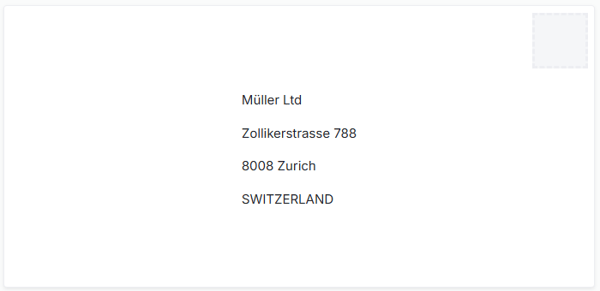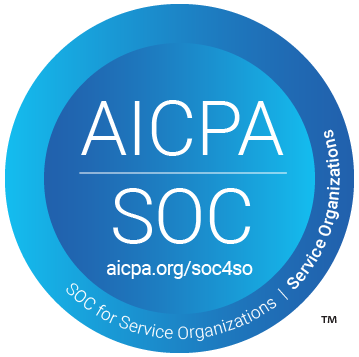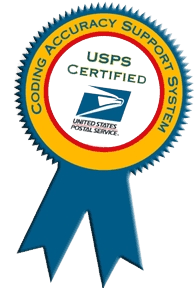This guide provides a comprehensive overview of Swiss address formatting, postal code structures, and localization practices. It includes information on postal services, languages, time zones, and address validation standards across Switzerland.
Address Format
Structure for standardized Swiss postal addresses.
Organization / BuildingBuilding
Thoroughfare PremisesNumber / SubPremises OR SubPremisesLevel
PostBoxType PostBoxNumber
PostalCode Locality
Country
Address Verification Data
Switzerland postal addresses verification data.
| Available: | Yes |
| Does the country use Postal Codes: | Yes |
| PO Box Indicator: | Postfach, Case Postale, Casella Postale, Poste Restante |
| ISO-2-Code: | CH |
| ISO-3-Code: | CHE |
| Phonecode: | 41 |
Address Example
Example of standardized Swiss postal addresses.

Country Info
Full Country Name:
Swiss Confederation (Schweizerische Eidgenossenschaft / Confédération suisse / Confederazione Svizzera / Confederaziun svizra)
| Country Alpha-2 code | CH |
|---|---|
| Country Alpha-3 code | CHE |
| Numeric Code | 756 |
Timezone
Switzerland uses Central European Time (CET): UTC+1, and Central European Summer Time (CEST): UTC+2 during Daylight Savings Time.
| Time Zone | UTC | DST |
|---|---|---|
| Central European Time (CET) | UTC+1 | UTC+2 |
Official Language
Switzerland has four official languages: German, French, Italian, and Romansh.
Fun Fact
- Switzerland is home to Europe’s highest-altitude railway station, Jungfraujoch, which sits at about 3,454 meters above sea level. (Insight Vacations)
- Swiss wine is so good that the Swiss tend to drink most of it themselves: only about 1% of Switzerland’s wine is exported. (Switzerland Tourism)
- Switzerland has four official languages: German, French, Italian, and Romansh. (Global Admissions)
- Switzerland uses its own currency (Swiss franc, CHF), not the euro. (Klook Travel)
- The Gotthard Base Tunnel is the world’s longest and deepest railway tunnel (~57 km / 35 miles), cutting through the Alps. (Global Admissions)
- Over 1,500 lakes cover parts of Switzerland. Lakes contribute to scenery, drinking water, hydroelectric power, and leisure. (Global Admissions)
- Swiss are big chocolate lovers. The average consumption is very high per capita. The country is known for its chocolate innovation (e.g. milk chocolate, Toblerone). (Global Admissions)
- Switzerland remains neutral in wars. It has not been in a foreign war since 1815. (Wikipedia)
Postal Authority
The Swiss Post (Die Schweizerische Post / La Poste Suisse / La Posta Svizzera) is the national postal service of Switzerland, operating as a public company owned by the Swiss Confederation. It provides domestic and international mail and parcel delivery, financial services through PostFinance, and digital solutions. Swiss Post ensures universal postal services across all cantons, maintaining a network of post offices and self-service points throughout the country.
Reference: https://www.post.ch
Name Conventions
Population Names
[opt: title] [given name] [opt: middle name(s)] [FAMILY NAME]
Examples:
- Herr Dr. Lukas Meier
- Madame Claire Dubois
- Prof. Markus von Keller
In Switzerland, names follow the Western naming convention and are regulated by the Swiss Civil Code. The typical structure includes one or more given names followed by a family name. Naming laws are applied by the local civil registry offices (Zivilstandsamt/Office d’état civil/Ufficio dello stato civile), ensuring that names are not offensive, overly fanciful, or detrimental to the child’s well-being.
Multilingual naming customs reflect the country’s four official languages (German, French, Italian, and Romansh). Diacritical marks such as ä, ö, ü, é, è, à, and ç are legally supported and commonly used. Traditionally, children inherit the father’s surname, but since legal reforms in 2013, parents may choose either parent’s surname or a double-barreled combination.
Titles such as Herr/Monsieur/Signor (Mr.), Frau/Madame/Signora (Mrs.), and academic titles like Dr. or Prof. are widely used in formal contexts but are not part of the legal name.
Organizational Names:
Swiss companies must be registered in the Handelsregister (German), Registre du commerce (French), or Registro di commercio (Italian), and the official name must include the correct legal entity designation.
Common examples include:
- AG / SA – Aktiengesellschaft / Société Anonyme (public limited company or stock corporation)
- GmbH / Sàrl / Sagl – Gesellschaft mit beschränkter Haftung / Société à responsabilité limitée / Società a garanzia limitata (private limited company)
- KolG / SNC – Kollektivgesellschaft / Société en nom collectif (general partnership)
Business names must be unique, linguistically appropriate for the region of registration, and must clearly indicate the legal form.







